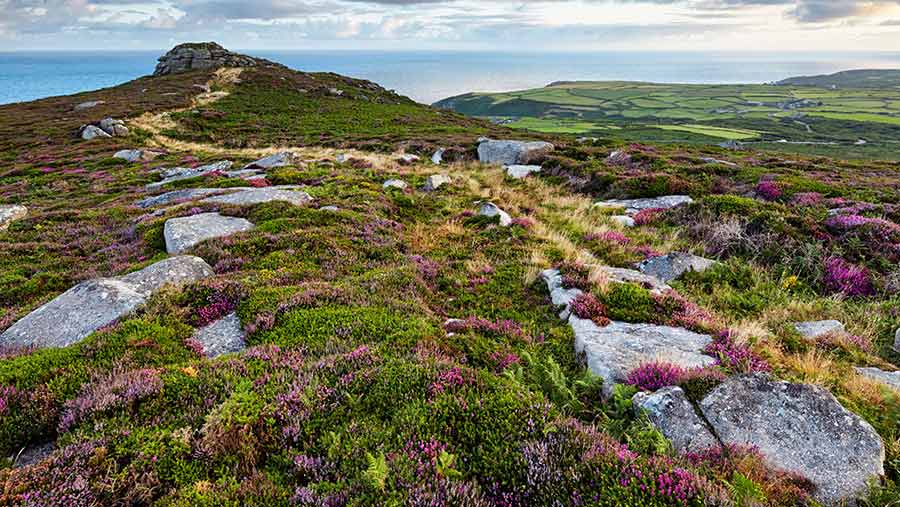Natural England spent £18k of taxpayers’ cash on SSSI hearing
 © Helen Dixon/Alamy
© Helen Dixon/Alamy Natural England spent more than £18,000 of taxpayers’ money on travel and accommodation to designate an area of Cornwall a heavily protected conservation area, Farmers Weekly can exclusively reveal.
Ten Natural England (NE) board members and 30 staff travelled to a hearing in St Ives to confirm West Penwith as a site of special scientific interest (SSSI) on 28 June this year.
That sum did not include payments of £328 each to nine board members for attending, or £546 paid to NE chair Tony Juniper. In total, board members were paid £3,498.
See also: Farmers exposed by Natural England data leak over Cornish SSSI plan
Farmers Weekly understands NE spent a large sum of money on security and venue hire in St Ives, but the agency did not respond to a request for this information.
An industry source who objected to the SSSI designation, and who attended the hearing, said: “NE’s timing of the designation meant that farmers could not do surveys in the prescribed manner, because it was winter.
“That also guaranteed that travel and accommodation costs, in a tourism resort, would occur during summer at peak season.”
Farmers Weekly can reveal that NE spent £268,645.34 on reports, including £6,912 of taxpayers’ money on a flawed Adas “Farmscoper” report that was subsequently withdrawn after farmers pointed out errors.
The government-funded body has come under fire for an intractable stance regarding board members’ register of interests.
Farmers Weekly requested a copy but was told by a spokesman: “We do not publish the register of interests of our board members. This is an internal record.”
However, NE’s standing orders state: “A register of members’ interests is held by NE’s legal and governance team. The register is open to public inspection.”
Our industry source said: “We have been trying to obtain the register since February and have been refused. I even travelled to their head office in York and was turned away.”
Alleged conflicts
On the morning of the confirmation hearing in St Ives, NE chairman Tony Juniper was served with a petition by attendees which listed alleged conflicts of interest of board members.
The Sunday Telegraph quoted an NE spokesman as saying: “Lay membership of a charitable organisation does not constitute a conflict of interest that would preclude board members from taking part in the SSSI decision-making process.”
However, at least two members of the NE board are trustees of such organisations, and not “lay members”.
Kerry ten Kate, who was not present at the hearing, is an RSPB trustee. According to NE, the RSPB received up to £1.8m from NE during the last three sets of accounts.
Dr Lynn Dicks is a trustee of the Royal Entomological Society but did not declare her interest at the hearing.
Only two of the conflicts of interest alleged by petitioners were declared by board members.
None of the 30 members of staff declared any interests, despite NE’s standing orders requiring them to do so.
£100k spent on three habitat surveys
Natural England’s response to Farmers Weekly’s Freedom of Information (FoI) request revealed the government body spent £100,224 on just three habitat surveys between 2012 and 2014.
However, objectors pointed out that three quarters of surveyed areas were missing one or more maps and tables, despite NE’s own Standing Order A9 mandating that “owners/occupiers have been given sufficient scientific evidence to inform them of the reasons the site is being considered for designation as a SSSI”.
Bird surveys, which were eight years old at the time of the hearing, cost £19,268.
The author of those reports proceeded to write a formal letter of support for the designation, but failed to mention the fact that they had been paid by NE.
A further £38,112 was spent on invertebrate surveys undertaken for only a third of the duration required by the Guidelines for SSSI Selection.
A sum of £59,154 was spent on desk-based hydrological surveys which did not undertake any chemical analysis of water.
The surveys also repeatedly disclaimed all knowledge of mining in the area despite West Penwith being world-famous for the age and extent of its tin, copper, gold and uranium mines.
